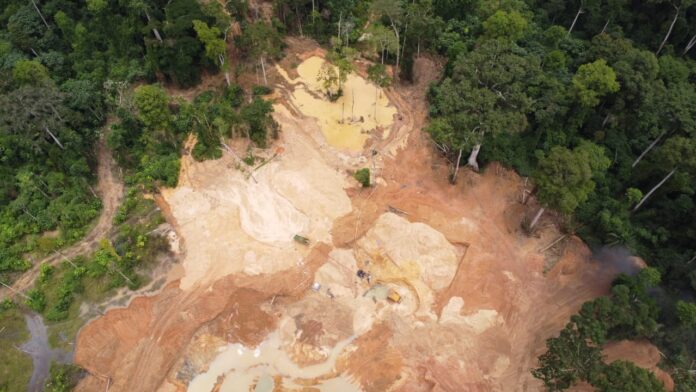The University Teachers Association of Ghana (UTAG) has issued an ultimatum to President John Dramani Mahama, demanding the immediate fulfilment of his electoral pledge to eradicate illegal mining, popularly known as galamsey.
In a press statement released on Sunday, July 20, the National Executive Council (NEC) of UTAG expressed deep dissatisfaction with the government’s progress on the issue and warned of possible industrial action if decisive steps are not taken promptly.
The statement, signed by National President Prof. Mamudu A. Akudugu and National Secretary Prof. Eliasu Mumuni, followed an emergency NEC meeting held on Thursday, July 17, 2025.
UTAG acknowledged the “modest gains achieved by the government through the Minister of Lands and Natural Resources and the security services,” including directives from the Inspector General of Police and the Attorney General to the Economic and Organised Crime Office (EOCO) to investigate political actors allegedly involved in galamsey.
However, the association emphasized that “much is left to be desired, as the wanton destruction of the environment continues unabated.”
At the centre of UTAG’s demand is the “anti-galamsey pledge” President Mahama voluntarily signed ahead of the 2024 general elections. This commitment, formalised in the “National Pledge by Presidential Candidate Taken Against Illegal and Irresponsible Mining (Galamsey) in Ghana,” was witnessed by the Ghana Coalition Against Galamsey (GCAG) and UTAG. It is considered by the association to be a “solemn social contract with the Ghanaian people to combat illegal mining and restore environmental integrity.”
“President Mahama’s assumption of office has not yet yielded the concrete actions required to match the gravity of his pledge,” the statement noted, urging the President to “walk the talk.”
UTAG outlined five key promises from the pledge they believe remain unfulfilled:
-
Immediate and Unambiguous Denunciation: Although the President promised to publicly condemn galamsey for its harm to the environment, health, and future generations, UTAG stated, “We are yet to witness the operationalisation of this pledge after six (6) months in office.”
-
Immediate Action to Halt Activities: While President Mahama described galamsey as a “national emergency” on July 15, 2025, and cited efforts by the national task force, UTAG criticised his refusal to declare a formal state of emergency in galamsey-affected areas, a move they believe would give “practical meaning to the pledge.”
-
Law Enforcement Without Fear or Favour: The pledge included empowering security agencies and the judiciary to strictly enforce the law regardless of political ties. UTAG noted, “We are yet to see this pledge materialised in a way that can halt and reverse the destruction of forest reserves, waterbodies, and arable lands.”
-
Implementation of Permanent Anti-Galamsey Policies: President Mahama promised to design and implement long-term strategies to permanently eliminate galamsey. UTAG stated, “We are yet to see any coherent, practically relevant and workable policies from the President and his government to address the menace permanently.”
-
Zero Tolerance Messaging from Political Actors: The President vowed to sanction party officials and dismiss MMDCEs who enable galamsey in their jurisdictions. UTAG asserted, “Not a single official has been dismissed, despite galamsey thriving in the Ashanti, Eastern, Western, and Ahafo Regions.”
The association further alleged that key members of the ruling party in heavily affected areas are involved in galamsey, yet face no consequences.
UTAG also urged the President to fulfil other related campaign promises, including repealing Legislative Instrument (L.I.) 2462, which allowed regulated mining in forest reserves. Though the government has indicated plans to repeal the L.I., UTAG insists the process must be expedited.
Describing galamsey as “an existential threat,” UTAG warned that it continues to devastate rivers, forests, farmlands, and long-term livelihoods. By the end of 2024, reports showed significant environmental and economic damage, with rivers such as the Pra, Ankobra, and Birim heavily polluted.
“If concrete steps are not taken promptly, UTAG will not hesitate to activate all constitutionally permitted avenues—including industrial action—to demand the fulfilment of these national commitments,” the statement warned.
Given UTAG’s past strikes and their impact on academic calendars, the threat of renewed action poses serious pressure on the government.
“The time for rhetoric is over; the time for action is now,” UTAG concluded, urging members and the general public to remain vigilant in safeguarding Ghana’s environment for future generations.
Source: David Apinga



